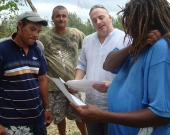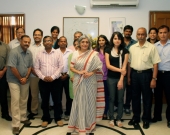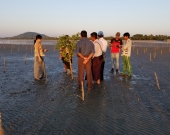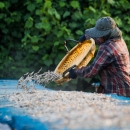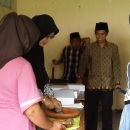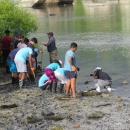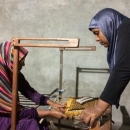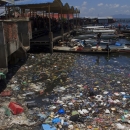Topics :: Empower civil society :: Sustainable Livelihoods
Sustainable Livelihoods
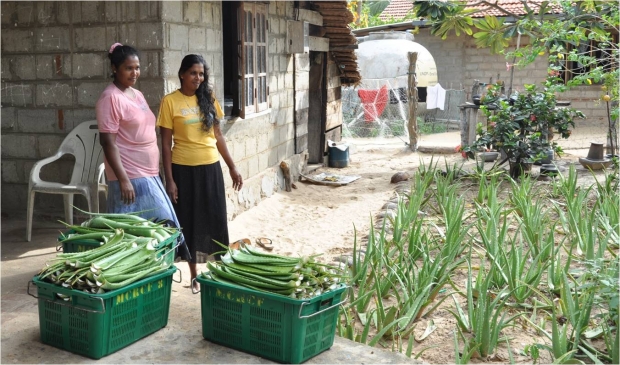
Aloe vera plantation managers , Sri Lanka © S. Christensen, 2011
The livelihoods of coastal communities are heavily dependent on resources and services provided by coastal ecosystems. From basic necessities including food, water and shelter to intrinsic services like tourism and recreation, coastal ecosystems cater to a multitude of human needs. The quality of these services and ecosystem health are in turn dependent on their judicious utilization by communities. Local people are not just recipients of these services but also exert direct influence on the nature and providing capacity of ecosystems.
The intricate links between local livelihoods and ecosystem health are now widely recognized. With coastal communities constantly evolving and diversification of their needs and occupations, there is a greater urgency to equate socio-economic and livelihood concerns with ecosystem health. It is now imperative that insightful parallels be drawn between decline in ecosystem health and livelihood activities.
MFF focuses on promoting livelihood activities that are environmentally sound, economically realistic and sustainable. Together with partners it seeks to address the challenges faced by coastal ecosystems and communities in the MFF countries. Through this programme of work MFF aims to develop models to guide livelihood restoration in post disaster situations, encourage replicable community led ecotourism activities, restore fisheries in tsunami affected areas and help market non-fish mangrove products.
For details about Actions, Outputs and Results, click [ + ]
Related News
MFF projects encourage public participation in coastal management
Bangkok, Thailand 25 Jul 2012
Country: Asia Region
Topic: Capacity development, Civil Society Engagement, Capacity Building ...
MFF aims to achieve long term solutions that contribute to regional and national efforts that ensure environment issues are mainstreamed in development planning and activities. Hence, bringing together governments, non-government entities and the pr...
MFF India Small Grant Mid-term Review
New Delhi, India 21 Sep 2012
Country: India
Topic: Knowledge for Management, Strategies for Management, Monitoring, Learning and Evaluation ...
The small grant mid-term review is a useful mechanism through which the progress of projects is evaluated and reviewed by the MFF Secretariat, NCB members and MFF partners.
Sometimes, you just need to let nature take its course
Myanmar 21 Nov 2018
Country: Myanmar
Topic: Civil Society Engagement, Community Resilence, Strategies for Management ...
Growing over an estimated area of over half a million hectares, mangrove coverage in Myanmar is the second largest in Asia after Indonesia. These mangroves provide food, shelter and livelihoods to millions of delta and coastal dwellers in Myanmar and...
Featured Projects
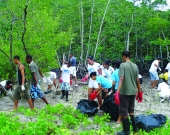
Enhancing community participation in sustainable coastal management
Duration:
Location: Port Glaud, Mahé, Seychelles
Topics: Knowledge for Management , Civil Society Engagement , Sustainable Livelihoods , Gender equality , Knowledge management and communications
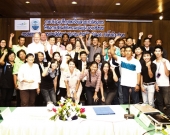
Strengthening the Community-based Coastal Resources Management Network through Community-based Learning Centers in Six Sub-districts of Trat Province, Thailand
Duration: 24 months
Location: Muang and Laem Ngob districts, Trat province
Topics: Capacity Building , Civil Society Engagement , Strategies for Management , Economic Valuation , Sustainable Livelihoods , Community Resilence , Financing Coastal Conservation , Capacity development

Promoting community participation in integrated coastal management in the North Western Province of Sri Lanka
Duration: 20 months
Location: The project was implemented in over 50 coastal villages, in nine coastal Divisional Secretariat Divisions in Puttalam District, in the North Western Province of Sri Lanka
Featured Film - Returning mangroves to Tanjung Panjang
Returning mangroves to Tanjung Panjang, Indonesia © IUCN, 2018
Mangrove forests worldwide have been vanishing at astonishing rates. Tanjung Panjang, Indonesia, which has lost over 60% of its mangroves in the last 3 decades, exemplifies this trend. The creation of aquaculture in nature reserves has in part led to this decrease in mangrove cover. With the help of IUCN's Restoration Opportunities Assessment Methodology (ROAM), local experts and several NGOs are working with current land users and the local government to restore forest landscapes and strive for a more sustainable future.
Related Events
MFF Phase 3 Regional Completion Workshop
Bangkok, Thailand 17 Dec 2018
MFF Phase 3 National Completion Workshops
Each MFF country 01 Nov 2018
14th Regional Steering Committee Meeting
Yangon, Myanmar 28 Sep - 02 Oct 2017
Related Images
Related Publications
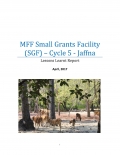
MFF Small Grants Facility Cycle 5 Jaffna - Lessons Learned Report
Author: MFF Sri Lanka
Publisher: MFF Sri Lanka
Posted on: 22nd Apr 2019
Category: SGF (Small Grant Facility)
Size: 1.1 MB
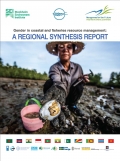
Gender in coastal and fisheries resource management: A Regional Synthesis Report
Author: MFF, SEI, SEAFDEC
Publisher: Mangroves for the Future
Posted on: 7th Mar 2019
Category: Asia Region (Secretariat)
Size: 3.7 MB
